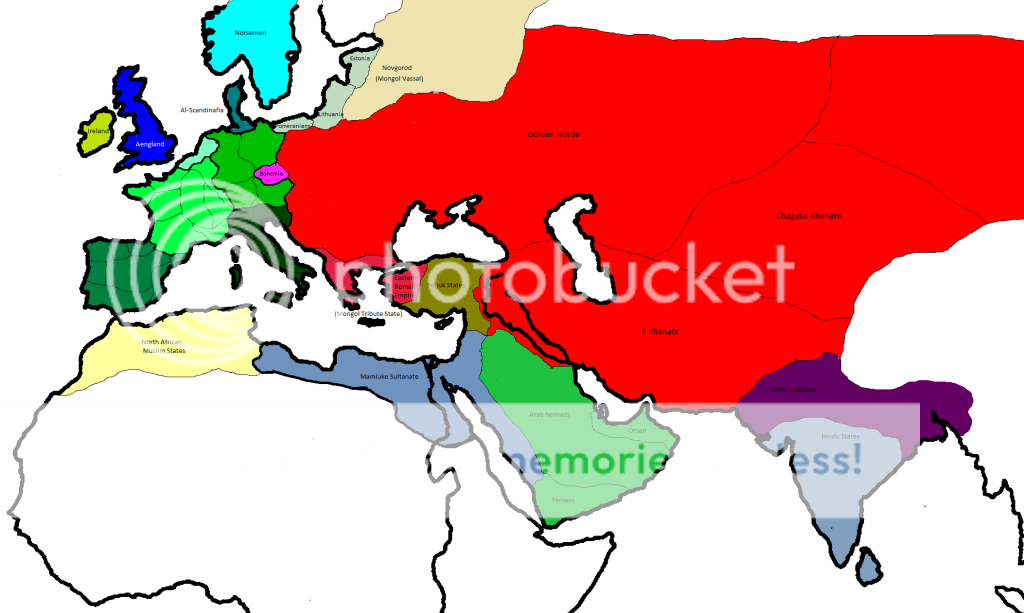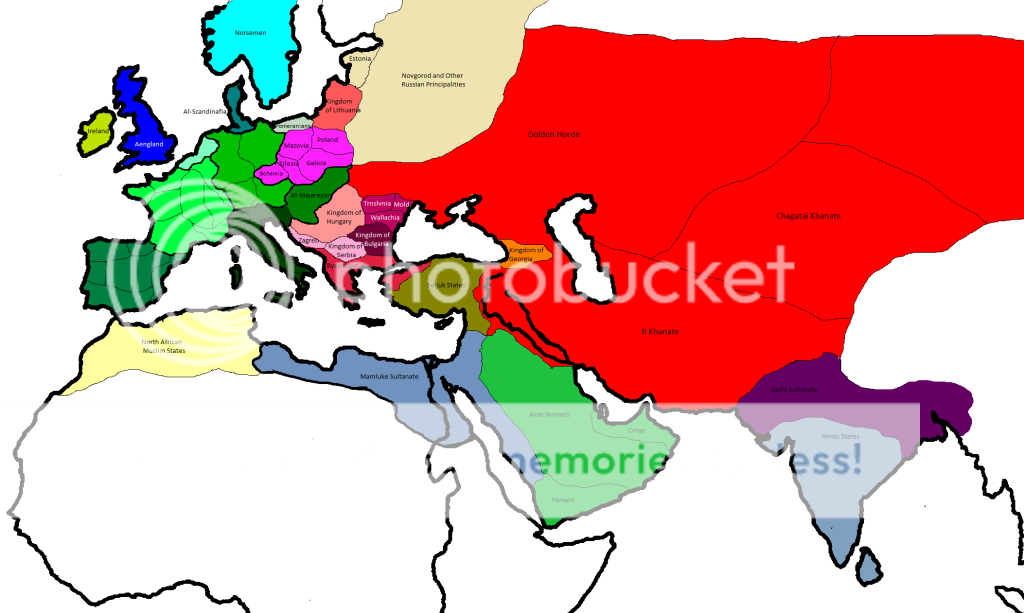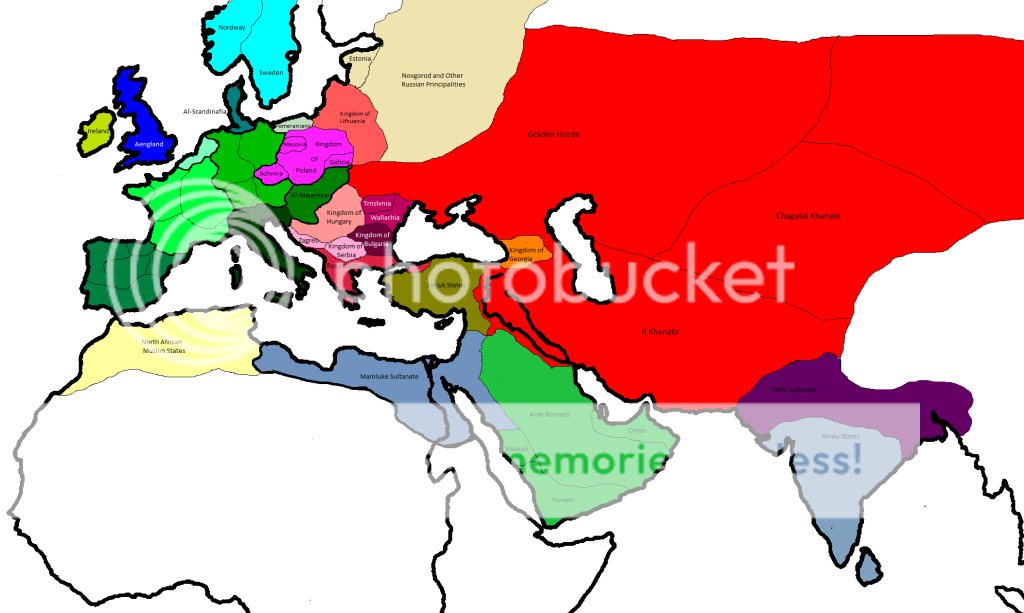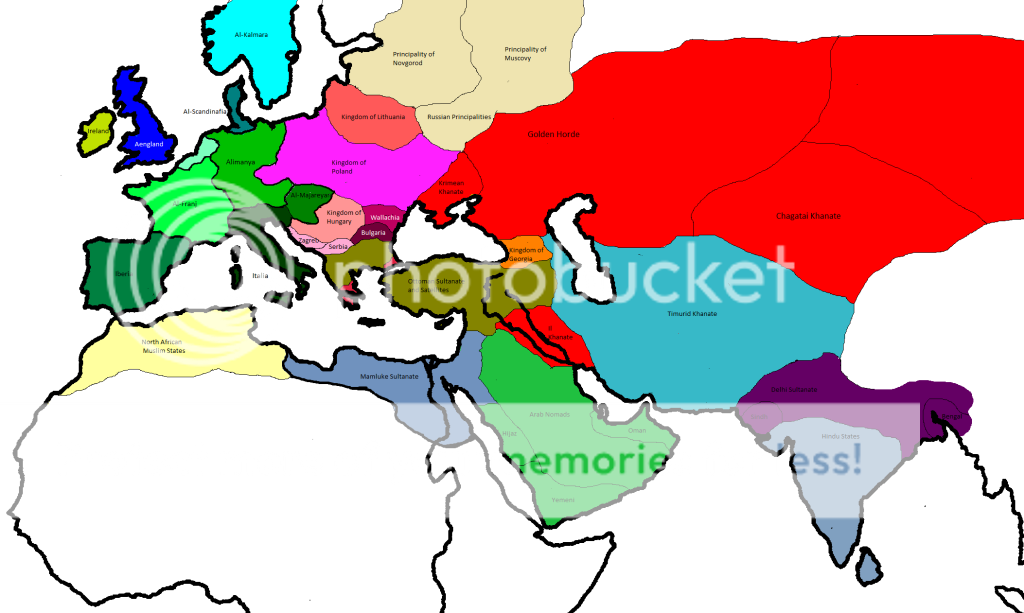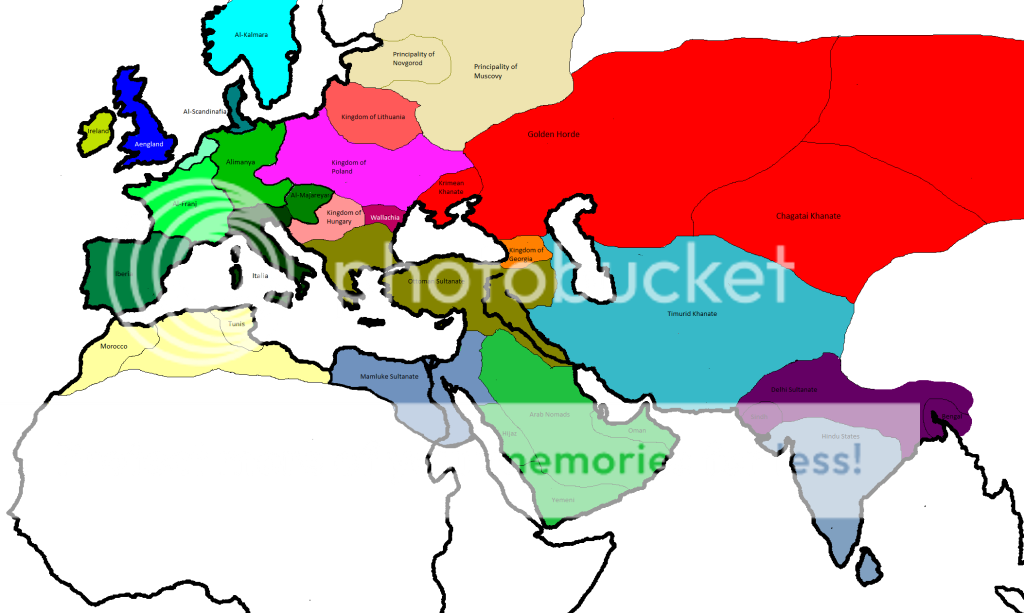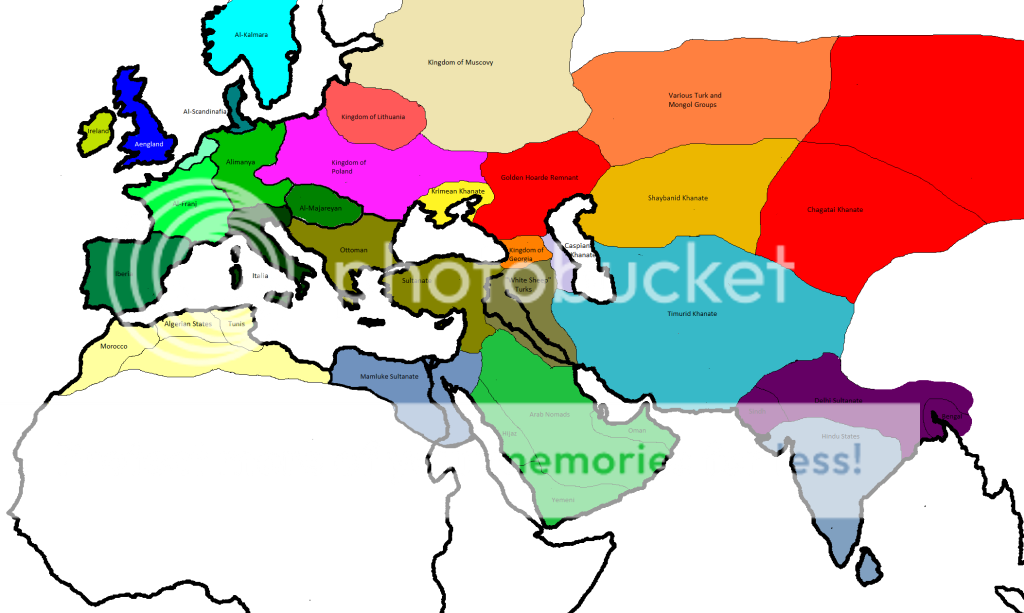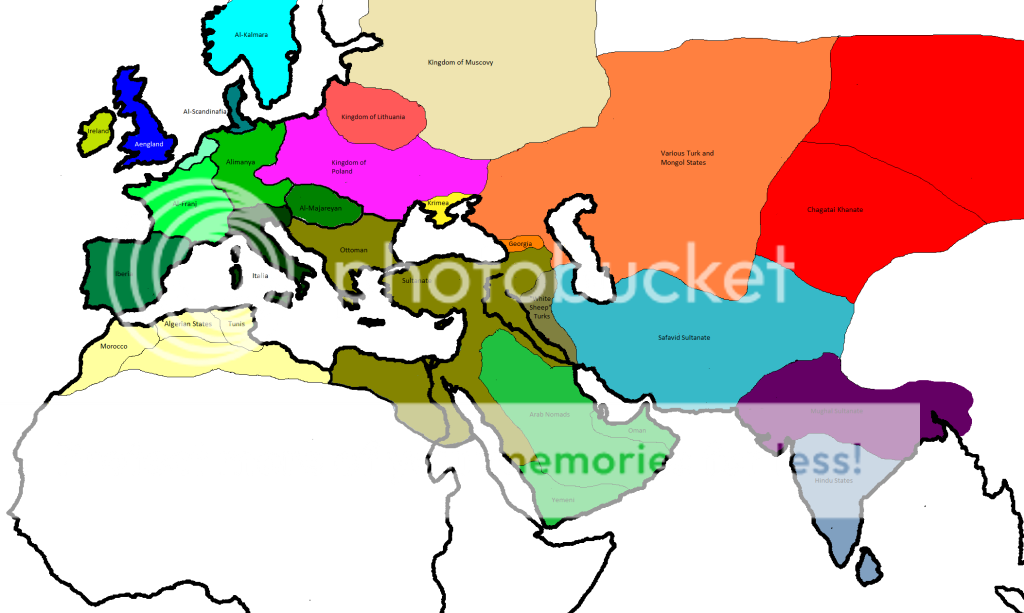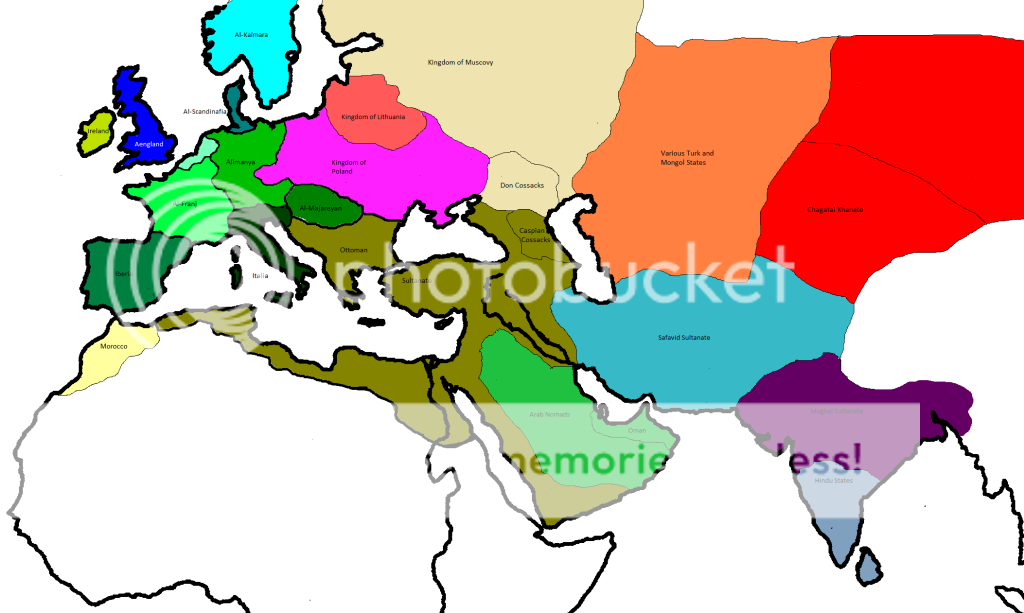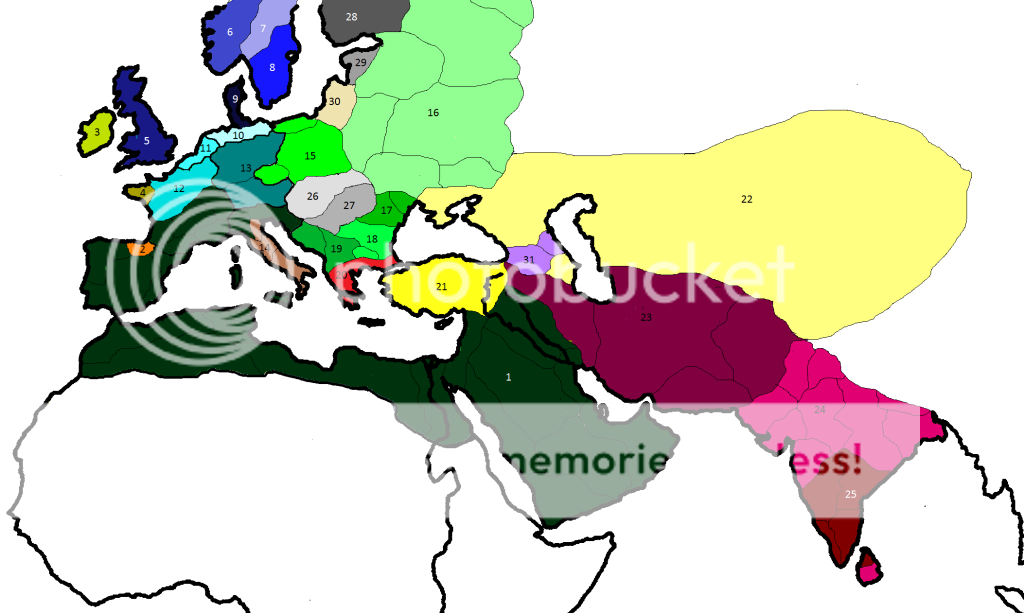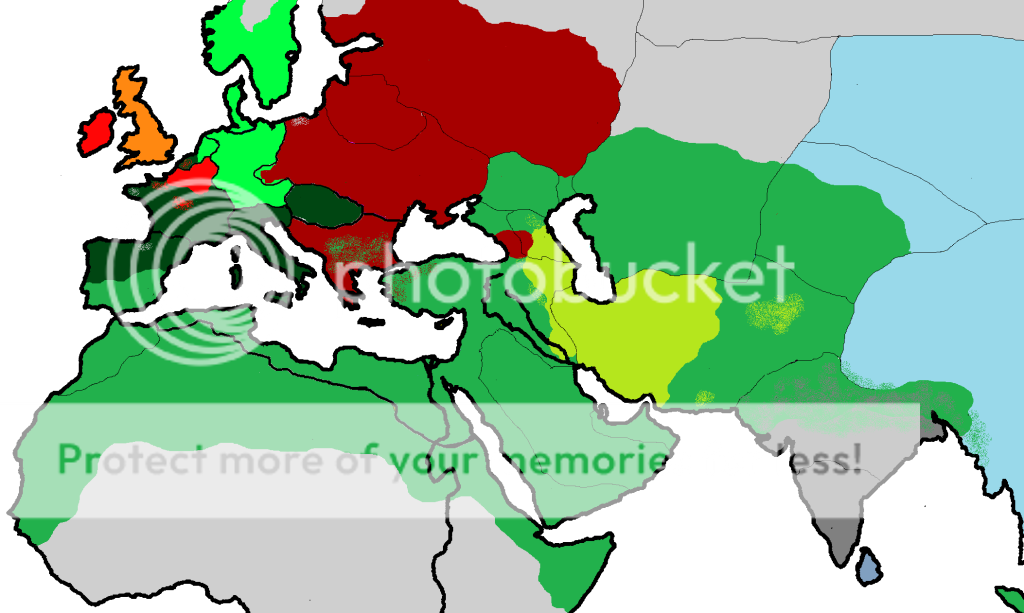Delvestius
Banned
In 732, Charles Martel, king of the Carolingian Franks, defeated the Muslim armies advancing into Gaul, ending northward Arab expansion and containing Islam in the Iberian peninsula for the next seven and a half centuries.
732 A.D.
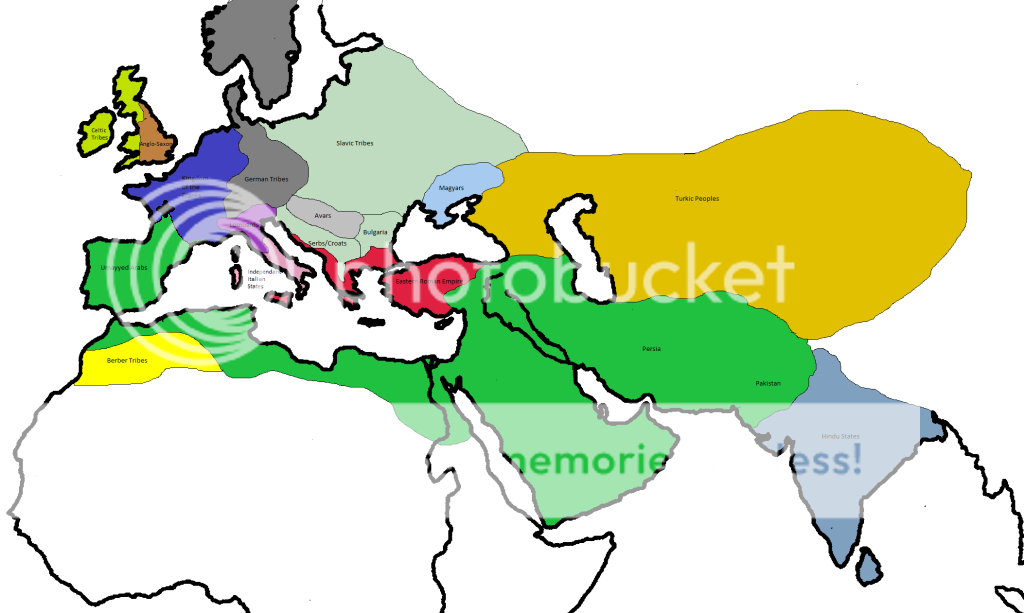
The Arabs, led by Abdul Rahman Al Ghafiqi, fielded a host centered around fast moving cavalry, while the Frankish defenders were primarily made up of spear infantry, lacking any effective horseman. The Arabs, underestimating the resolve and courage of the Franks, were defeated by the use of anti-cavalry spear boxes.
Perhaps this defeat could have been avoided. Perhaps the Arabs defeat the Franks and continue to wage war in Europe. If this is the case, southern France would be taken in the name of Islam.
The Germanic tribes, such as the Saxons or Alemmanians, were not organized well enough to defend from such a large force, and they had no cavalry, which means they were hopelessly outmatched in terms of speed. The Lombards as well lacked a comparable Military, as is evident from the fact that they capitulated to the Franks a mere 32 years later in the OT. With a fragmented Frankish state to the north, the Arabs would turn their attention to Italy and the Papacy.
Note- It is likely, as this map and the map at the bottom of the page posted by Immortalimpi details, that regions of northern France could remain Catholic and prepared to defend from or even eventually reverse Arab rule. If that's the case, then the Muslim conquest of Italy and Germany would not happen. However, this timeline is one in which Al Ghafiqi has significantly greater support from the Caliph back home in terms of soldiers and supplies, which would allow the Muslims to conquer Western Europe.
It should also be noted that the regions of Basque and Brittany will continue to attempt to exercise autonomy under Arab hegemony with varying levels of success until the centralization of Arab rule in these regions a few centuries later.
Approx. 750 A.D.*
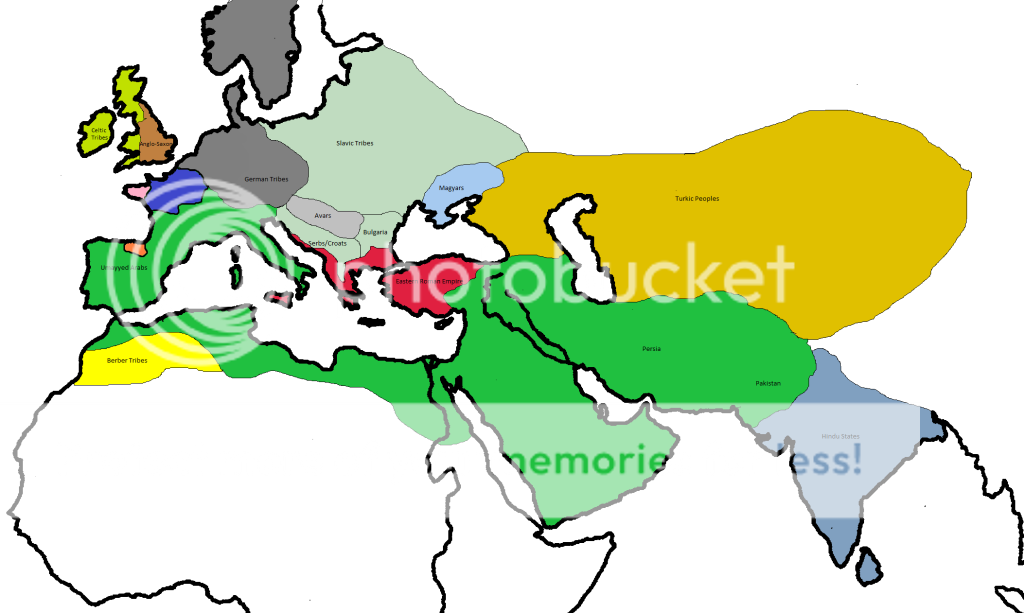
With the Arabs becoming the new powerhouse of Europe, Islam would no doubt become the most practiced religion. The territories conquered by the Islamic Armies would be inherited by wealthy Arab generals and nobles, and even perhaps Christian nobles who convert. This would cause a general breakdown of "The Caliphate", it becoming more of a federation of Islamic states than a cohesive empire.
Britain would remain the last Christian nation in Western Europe, suffering the occasional sea raid.
Approx. 780 A.D.*
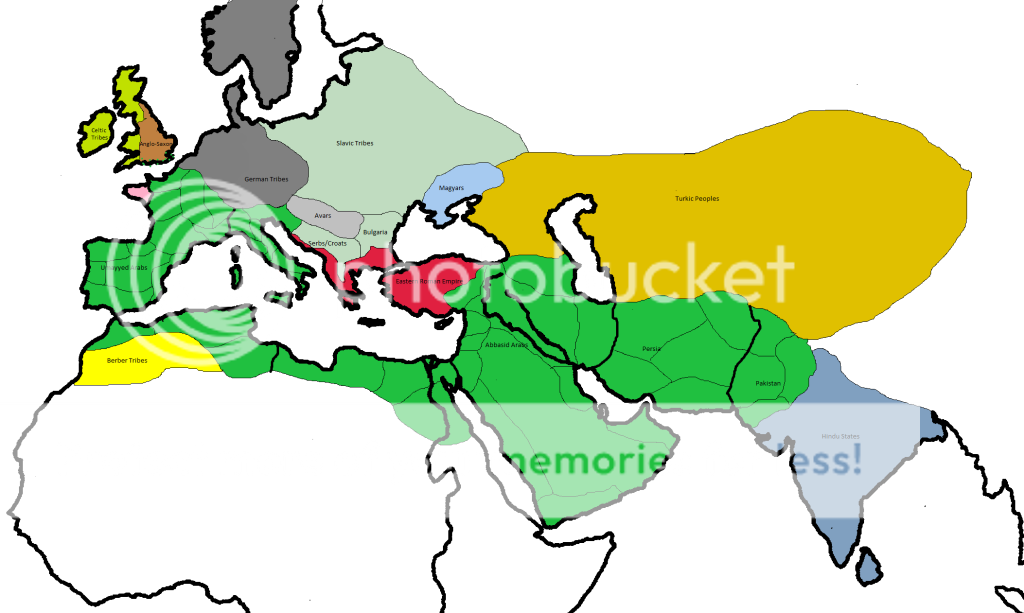
By around 800 A.D, The Caliphate begins to lose power in the west, while still having a firm hold in the far east over Persia, Punjab, Sindh, etc. The Berber tribes take this and use it to their advantage, many of them casting of Arab rule. Near the Crimea, the Magyars continue to inch their way into the Balkans. The regions of Islamic Spain, Italy and France become quasi-feudal states along preexisting language barriers as the Norseman prepare to begin their raids.
Without any strong unifying factor (which Christianity had provided in the OT), the Germanic Pagans of Central Europe continue to be mostly nomadic, with no true urbanization factor to appear in the near future. Thus, no kingdom has yet arisen.
Note- Spain, France and Italy will progress in the same decentralized, feudal manner that Christian Europe had, with emirates and sultanates replacing duchies and kingdoms. The color division represents the language barriers of these regions, but little else. Even the lines given within these areas are simply to represent the internal division of these areas, and do not necessarily stay exactly as shown throughout the timeline.
Approx 800. A.D.
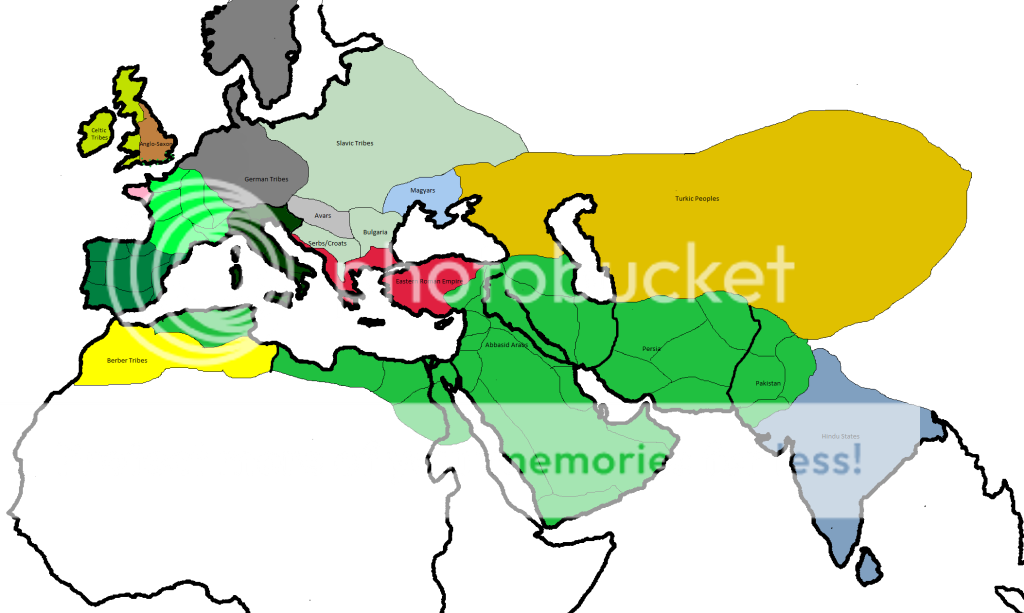
Around 850 A.D, the Norse begin to raid northern France, but with less of an effect than they would of had on a Christian France, so they focus more on German and Frisian Coastal Towns, an easier target. England is still raided as in OT. The Magyars continue to work their way into Europe, and the Kievan Rus appear in Russia. Independent Persian sentiments begin to form in Baluchistan and Sindh. By now, most slavs are Eastern orthodox, whereas the Muslim west begins to convert the Germanic tribes.
Approx. 850 A.D.
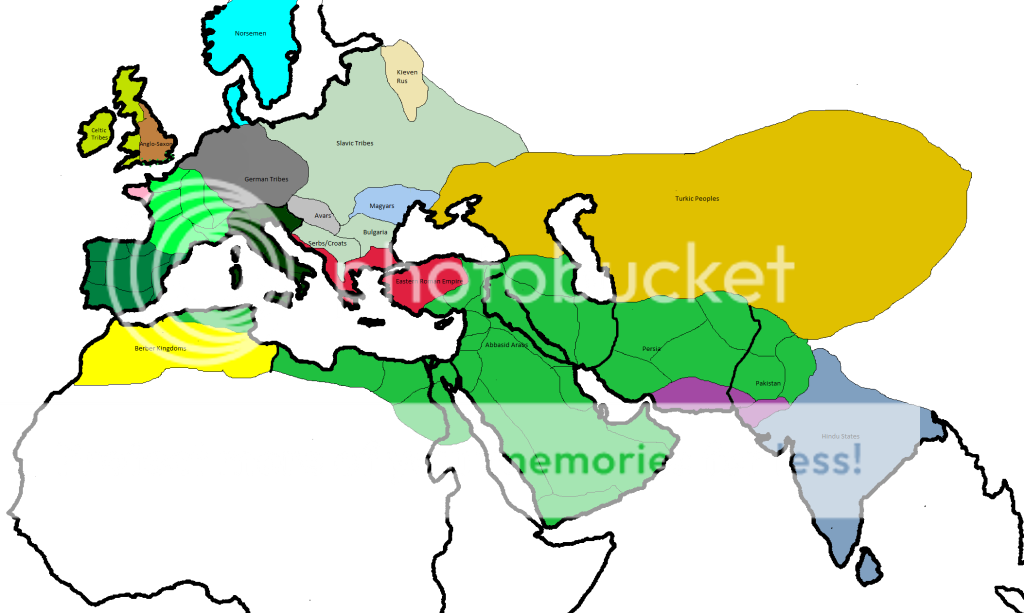
By 900 A.D, the Avars have been overran by the Magyars, who finally settle down in the Great Hungarian Plains. The eastern reached of The Caliphate joins the new Persia. The Kieven Rus expand in power and Muslim France begins to move eastward into Germany. The Norsemen begin to colonize parts of Britain and Germany.
900 A.D.
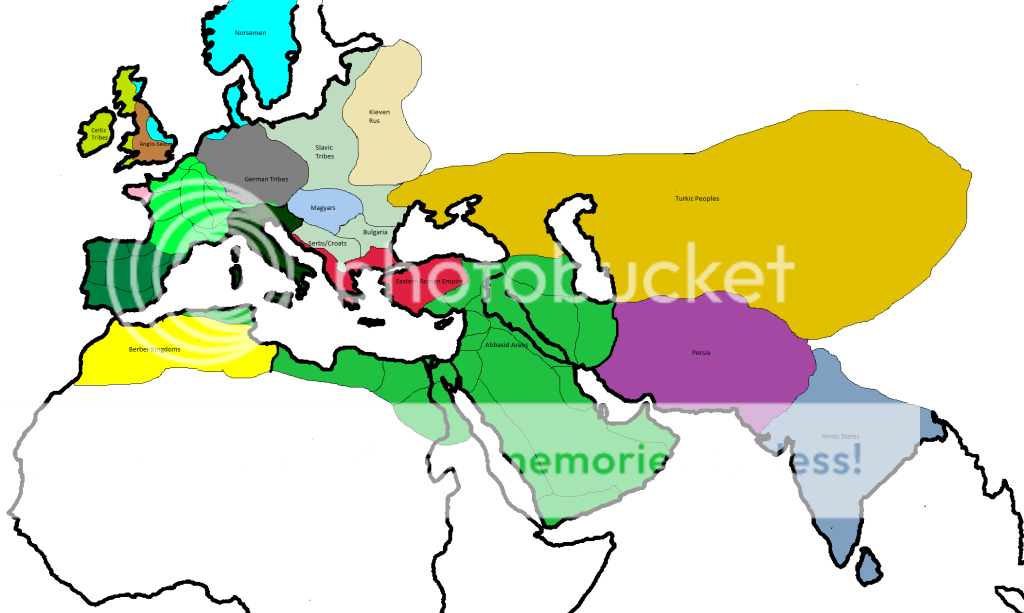
By 950 A.D, the Orthodox Serbian and Bulgarian Empire join a league with the Byzantines to defend from a possible Muslim invasion. The Norse move further into England, supplanting the Anglo-Saxons, as well as moving further along the north German coast. Muslim France continues it's westward march of conversion and conquest. The Slavs along the Baltic coast begin to have a distinct culture from those living further south. The Kieven Rus in continuing to expand in size and power, and the Pechenegs, and Turkic people, are causing problems in Dacia. Persia continues to gain power.
950 A.D.
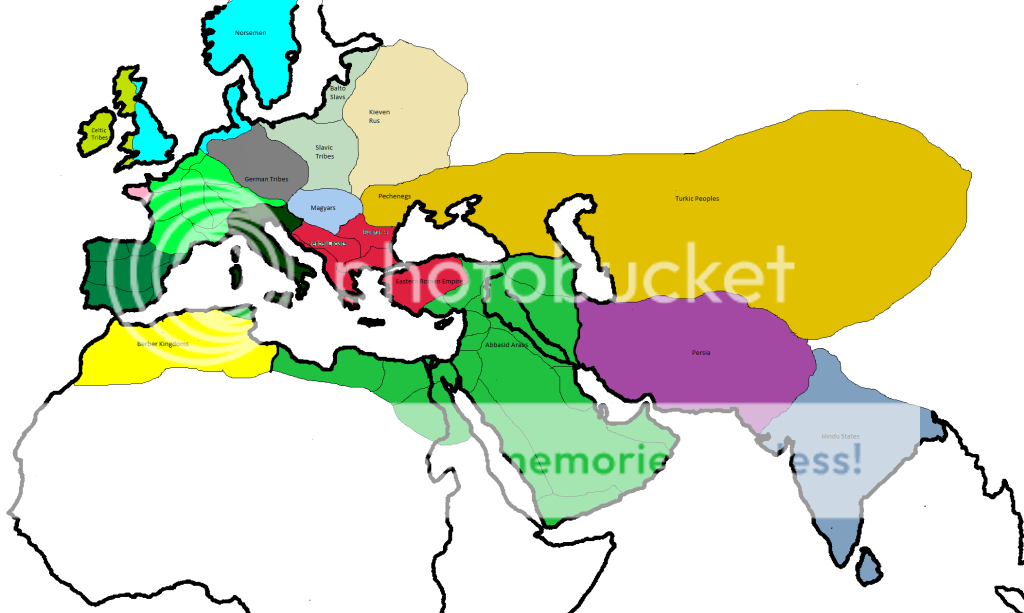
By 1000 A.D, Norsemen in England have subjugated both the Anglo-Saxons and the Celts, leaving Ireland as the only Celtic (and Christian) region. England itself is largely split between Norse Paganism and Christianity, leading in some cases to strange folk religions. In north Africa, Libya and Egypt declare independence from The Abbasid Caliphate and form the Fatimid Caliphate over doctrinal disagreements. The Magyars become converted, the north to Islam and the South to Orthodox. The Kieven Rus, on the verge of collapse to do the competitive nature of various successful city states, has also converted to Orthodox. Muslim France continues to convert westward, allowing for some early Germanic states to coalesce, the Norse continue to colonize southward, strengthening Paganism, and the Slavic tribes continue to be predominately pagan, with Orthodox encroaching from the east. In the east, Persia has collapsed into many smaller entities, all sharing a similar faith and language.
1000 A.D.
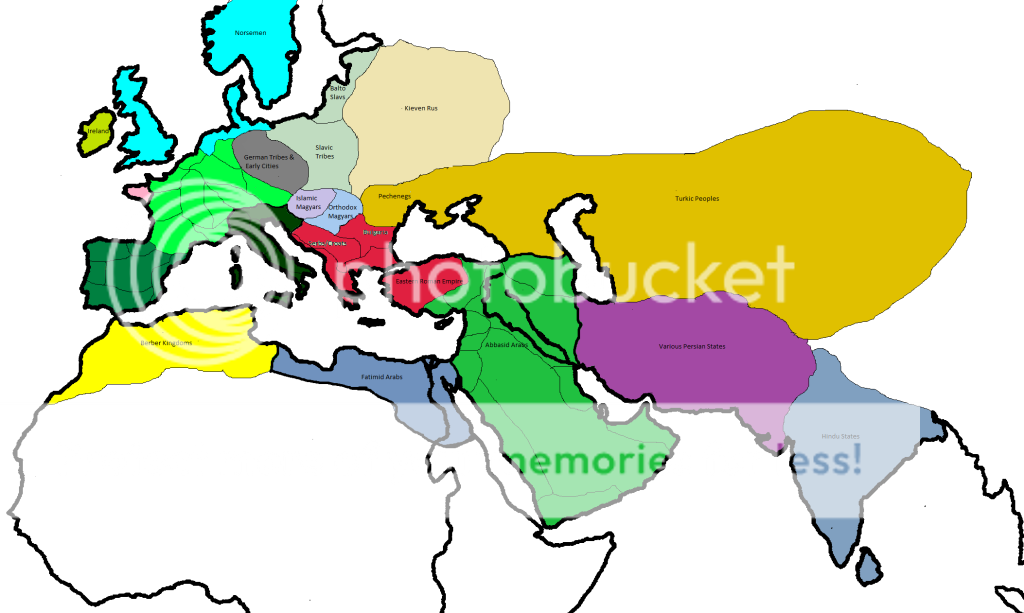
By 1050 A.D, Muslim expansion into Germany creates four organized regions of German speaking Muslims: Saxony, Alemmania, Bavaria and German Pomerania. While not necessarily united into one kingdom, they are recognized by other Muslim powers as legitimate Islamic states. The pagan Norse continue to push downward, seeking to colonize more land, but the Germans soon halt their advance in an uneasy stalemate. The Slavs of central Europe coalesce into one of three main groups: The Pomeranians, the Poles and the Bohemians. The dominion of the Kieven Rus has split into various Orthodox principalities, where trade thrives among the many river systems. The Cumans, a Turkic people, begin to encroach upon the lands of the Pechenegs. In north Africa, the Almoravids invade the Berber states in Morocco and cross into Andalusia, where they gain a foothold but are contained by Muslims there. The Seljuk Turks invade Persia at lightning pace, claiming all lands west of the Hindu-Kush Mountains, leaving the Persian communities in the mountain range intact.
1050 A.D.
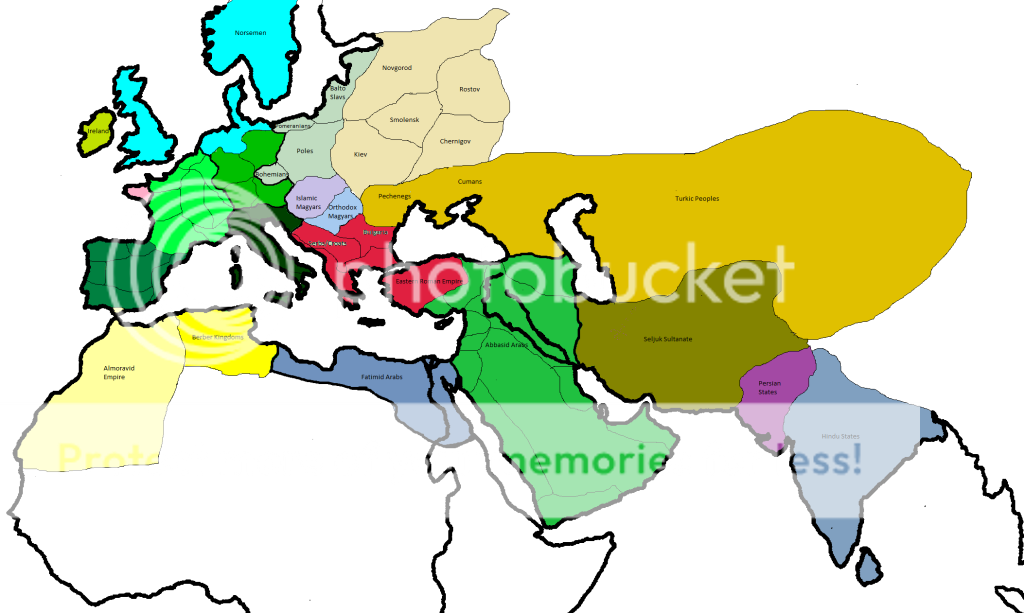
By 1100 A.D, the Almoravids are pushed out of Spain, the Abbasid Caliphate capitulates to the Seljuk Turks, allowing the Fatimid Caliphate to acquire the Hijaz and creating wealthy coastal states in the Levant. The peoples of the Caucasus mountains celebrate autonomy for the first time in ages. Poland is declared an Orthodox Kingdom by the Patriarch of Constantinople.
1100 A.D.
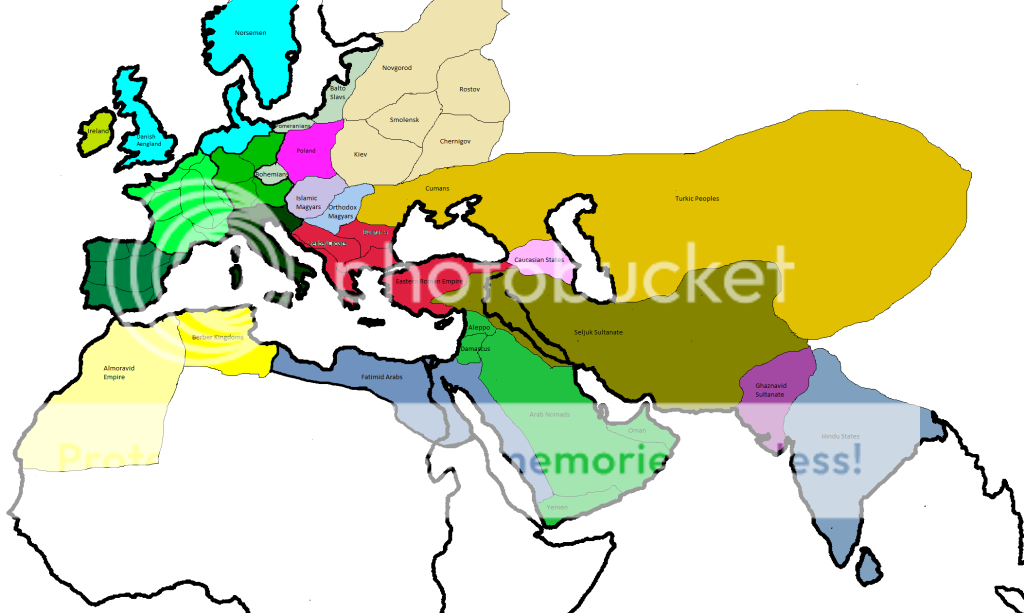
By 1150 A.D, The Almoravids conquer the Berber states and the Fatimids expand to include Yemen and Palestine. Out of the Ghaznavid Sultanate, the Ghurid Sultanate is born, which fills the gap the Seljuks left as they moved westward. Orthodox Bohemia is declared a vassal kingdom of Poland and the Dutch speaking Muslims of northern Europe gain autonomy, declaring the Emirate of Batavia. The Estonians (Not Balto-Slavic, but occupying the same area as them) and the Lithuanians coalesce into minor powers.
1150 A.D.
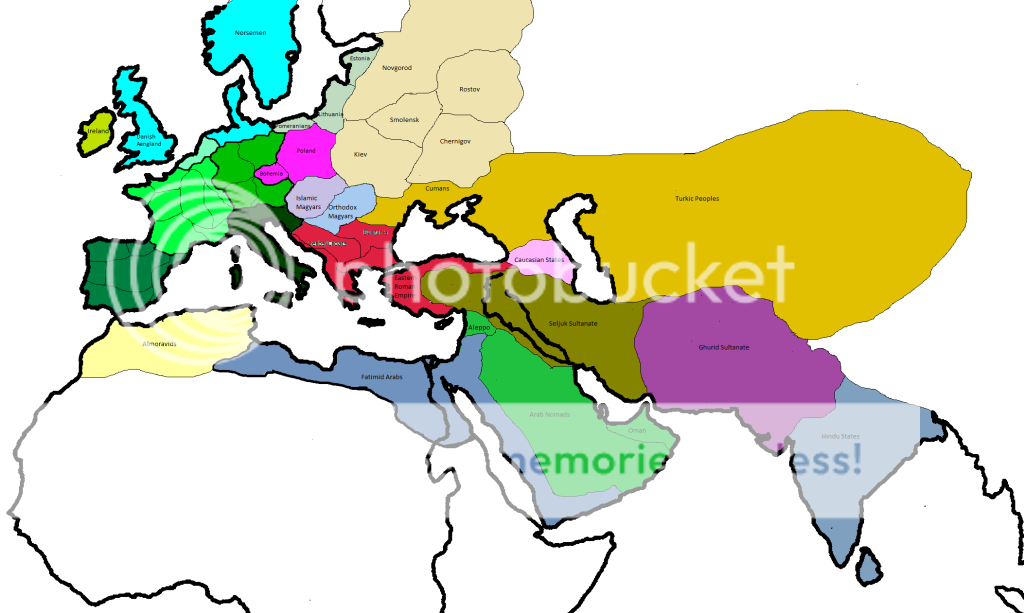
By 1200 A.D, the Ghaznavids split into the Khwarezm Sultanate of Persia and the Delhi Sultanate of India, the first major Islamic power to arise in that area. The Fatimids focus on expanding their eastern border, leaving their western territories vulnerable. The German states continue to push the Vikings northward, and the Russian principalities continue to expand.
1200 A.D.
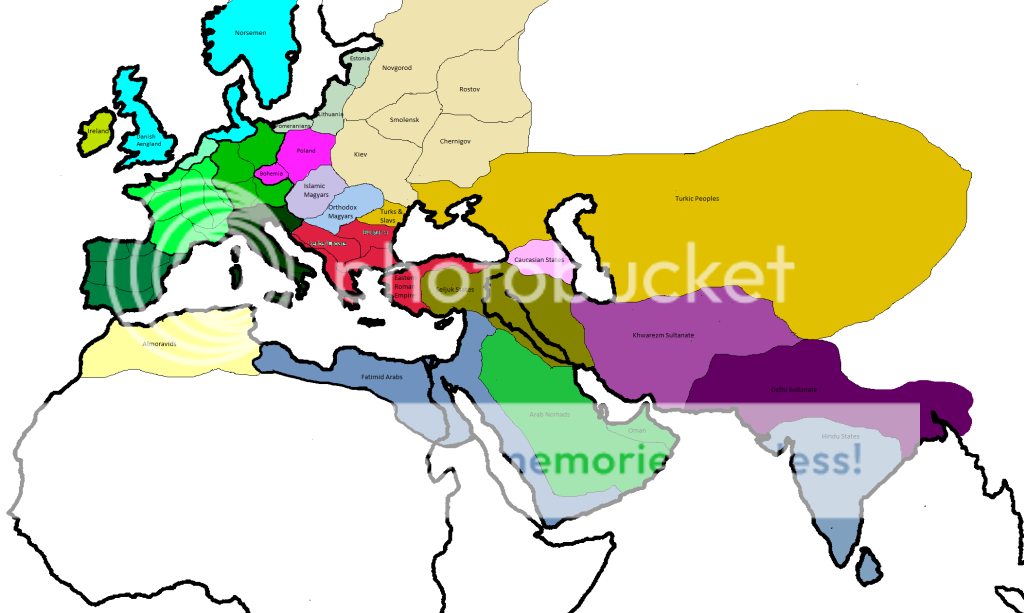
Here we see the Mongols beginning their initial conquest. The peoples of Dacia, namely the Valachs and Moldovans, have united under an Orthodox crown to create the Kingdom of Romania.
1220 A.D.
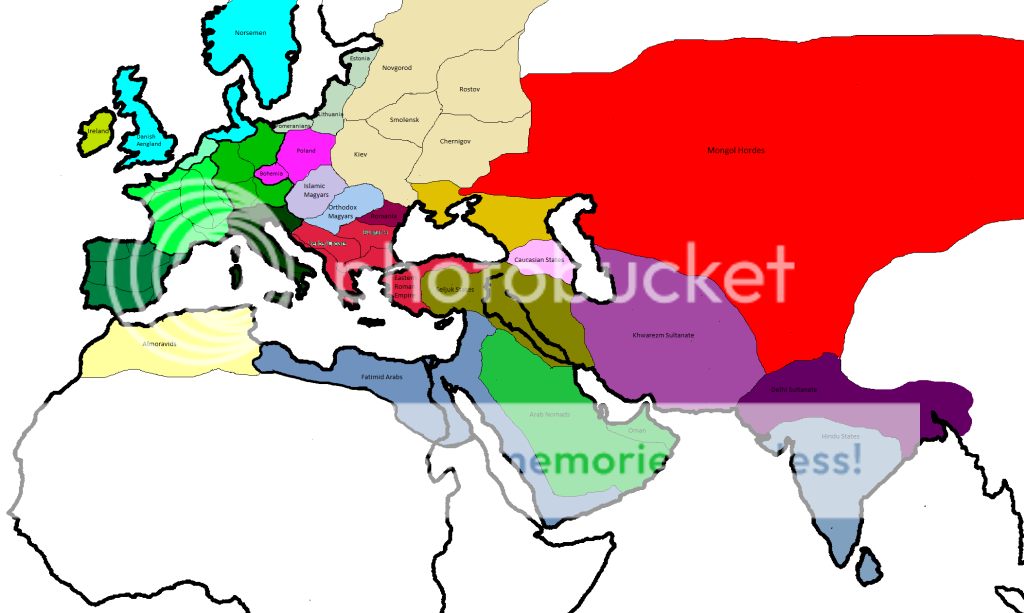
By 1260 A.D, the Mongols have captured Transoxania, Persia, the Middle East, the Caucasus Mountains, and Russia, and continue to press westward into Europe. They have made vassals of both Novgorod, the most powerful Russian city-state, and the Byzantine Empire, the center of Christianity in Europe. England, while still sharing cultural and lingual ties with the Norse, create their own kingdom, it's faith a version of Christianity in which influence from Norse paganism is readily apparent.
1260 A.D.
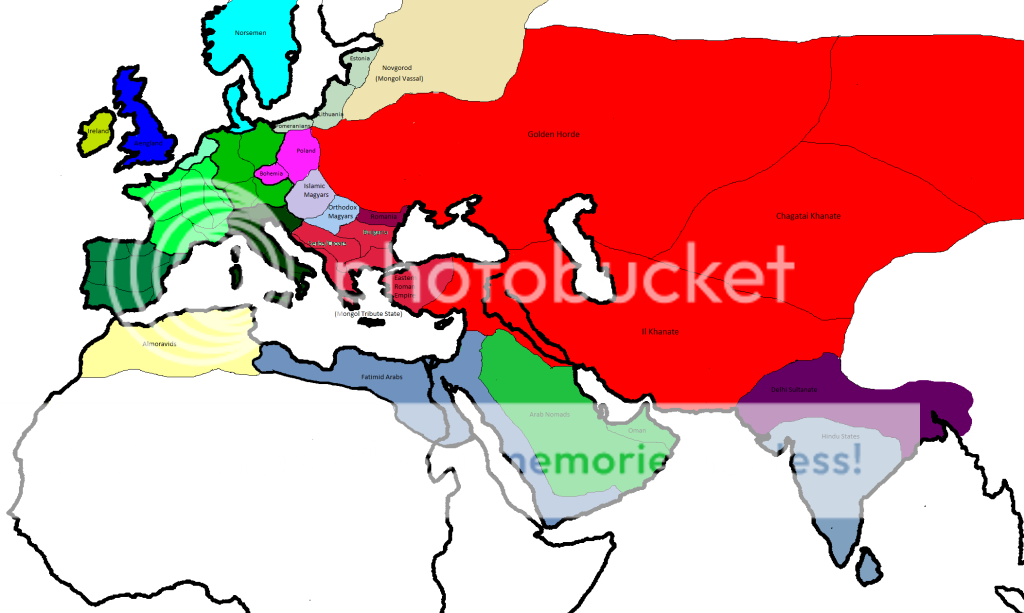
732 A.D.

The Arabs, led by Abdul Rahman Al Ghafiqi, fielded a host centered around fast moving cavalry, while the Frankish defenders were primarily made up of spear infantry, lacking any effective horseman. The Arabs, underestimating the resolve and courage of the Franks, were defeated by the use of anti-cavalry spear boxes.
Perhaps this defeat could have been avoided. Perhaps the Arabs defeat the Franks and continue to wage war in Europe. If this is the case, southern France would be taken in the name of Islam.
The Germanic tribes, such as the Saxons or Alemmanians, were not organized well enough to defend from such a large force, and they had no cavalry, which means they were hopelessly outmatched in terms of speed. The Lombards as well lacked a comparable Military, as is evident from the fact that they capitulated to the Franks a mere 32 years later in the OT. With a fragmented Frankish state to the north, the Arabs would turn their attention to Italy and the Papacy.
Note- It is likely, as this map and the map at the bottom of the page posted by Immortalimpi details, that regions of northern France could remain Catholic and prepared to defend from or even eventually reverse Arab rule. If that's the case, then the Muslim conquest of Italy and Germany would not happen. However, this timeline is one in which Al Ghafiqi has significantly greater support from the Caliph back home in terms of soldiers and supplies, which would allow the Muslims to conquer Western Europe.
It should also be noted that the regions of Basque and Brittany will continue to attempt to exercise autonomy under Arab hegemony with varying levels of success until the centralization of Arab rule in these regions a few centuries later.
Approx. 750 A.D.*

With the Arabs becoming the new powerhouse of Europe, Islam would no doubt become the most practiced religion. The territories conquered by the Islamic Armies would be inherited by wealthy Arab generals and nobles, and even perhaps Christian nobles who convert. This would cause a general breakdown of "The Caliphate", it becoming more of a federation of Islamic states than a cohesive empire.
Britain would remain the last Christian nation in Western Europe, suffering the occasional sea raid.
Approx. 780 A.D.*

By around 800 A.D, The Caliphate begins to lose power in the west, while still having a firm hold in the far east over Persia, Punjab, Sindh, etc. The Berber tribes take this and use it to their advantage, many of them casting of Arab rule. Near the Crimea, the Magyars continue to inch their way into the Balkans. The regions of Islamic Spain, Italy and France become quasi-feudal states along preexisting language barriers as the Norseman prepare to begin their raids.
Without any strong unifying factor (which Christianity had provided in the OT), the Germanic Pagans of Central Europe continue to be mostly nomadic, with no true urbanization factor to appear in the near future. Thus, no kingdom has yet arisen.
Note- Spain, France and Italy will progress in the same decentralized, feudal manner that Christian Europe had, with emirates and sultanates replacing duchies and kingdoms. The color division represents the language barriers of these regions, but little else. Even the lines given within these areas are simply to represent the internal division of these areas, and do not necessarily stay exactly as shown throughout the timeline.
Approx 800. A.D.

Around 850 A.D, the Norse begin to raid northern France, but with less of an effect than they would of had on a Christian France, so they focus more on German and Frisian Coastal Towns, an easier target. England is still raided as in OT. The Magyars continue to work their way into Europe, and the Kievan Rus appear in Russia. Independent Persian sentiments begin to form in Baluchistan and Sindh. By now, most slavs are Eastern orthodox, whereas the Muslim west begins to convert the Germanic tribes.
Approx. 850 A.D.

By 900 A.D, the Avars have been overran by the Magyars, who finally settle down in the Great Hungarian Plains. The eastern reached of The Caliphate joins the new Persia. The Kieven Rus expand in power and Muslim France begins to move eastward into Germany. The Norsemen begin to colonize parts of Britain and Germany.
900 A.D.

By 950 A.D, the Orthodox Serbian and Bulgarian Empire join a league with the Byzantines to defend from a possible Muslim invasion. The Norse move further into England, supplanting the Anglo-Saxons, as well as moving further along the north German coast. Muslim France continues it's westward march of conversion and conquest. The Slavs along the Baltic coast begin to have a distinct culture from those living further south. The Kieven Rus in continuing to expand in size and power, and the Pechenegs, and Turkic people, are causing problems in Dacia. Persia continues to gain power.
950 A.D.

By 1000 A.D, Norsemen in England have subjugated both the Anglo-Saxons and the Celts, leaving Ireland as the only Celtic (and Christian) region. England itself is largely split between Norse Paganism and Christianity, leading in some cases to strange folk religions. In north Africa, Libya and Egypt declare independence from The Abbasid Caliphate and form the Fatimid Caliphate over doctrinal disagreements. The Magyars become converted, the north to Islam and the South to Orthodox. The Kieven Rus, on the verge of collapse to do the competitive nature of various successful city states, has also converted to Orthodox. Muslim France continues to convert westward, allowing for some early Germanic states to coalesce, the Norse continue to colonize southward, strengthening Paganism, and the Slavic tribes continue to be predominately pagan, with Orthodox encroaching from the east. In the east, Persia has collapsed into many smaller entities, all sharing a similar faith and language.
1000 A.D.

By 1050 A.D, Muslim expansion into Germany creates four organized regions of German speaking Muslims: Saxony, Alemmania, Bavaria and German Pomerania. While not necessarily united into one kingdom, they are recognized by other Muslim powers as legitimate Islamic states. The pagan Norse continue to push downward, seeking to colonize more land, but the Germans soon halt their advance in an uneasy stalemate. The Slavs of central Europe coalesce into one of three main groups: The Pomeranians, the Poles and the Bohemians. The dominion of the Kieven Rus has split into various Orthodox principalities, where trade thrives among the many river systems. The Cumans, a Turkic people, begin to encroach upon the lands of the Pechenegs. In north Africa, the Almoravids invade the Berber states in Morocco and cross into Andalusia, where they gain a foothold but are contained by Muslims there. The Seljuk Turks invade Persia at lightning pace, claiming all lands west of the Hindu-Kush Mountains, leaving the Persian communities in the mountain range intact.
1050 A.D.

By 1100 A.D, the Almoravids are pushed out of Spain, the Abbasid Caliphate capitulates to the Seljuk Turks, allowing the Fatimid Caliphate to acquire the Hijaz and creating wealthy coastal states in the Levant. The peoples of the Caucasus mountains celebrate autonomy for the first time in ages. Poland is declared an Orthodox Kingdom by the Patriarch of Constantinople.
1100 A.D.

By 1150 A.D, The Almoravids conquer the Berber states and the Fatimids expand to include Yemen and Palestine. Out of the Ghaznavid Sultanate, the Ghurid Sultanate is born, which fills the gap the Seljuks left as they moved westward. Orthodox Bohemia is declared a vassal kingdom of Poland and the Dutch speaking Muslims of northern Europe gain autonomy, declaring the Emirate of Batavia. The Estonians (Not Balto-Slavic, but occupying the same area as them) and the Lithuanians coalesce into minor powers.
1150 A.D.

By 1200 A.D, the Ghaznavids split into the Khwarezm Sultanate of Persia and the Delhi Sultanate of India, the first major Islamic power to arise in that area. The Fatimids focus on expanding their eastern border, leaving their western territories vulnerable. The German states continue to push the Vikings northward, and the Russian principalities continue to expand.
1200 A.D.

Here we see the Mongols beginning their initial conquest. The peoples of Dacia, namely the Valachs and Moldovans, have united under an Orthodox crown to create the Kingdom of Romania.
1220 A.D.

By 1260 A.D, the Mongols have captured Transoxania, Persia, the Middle East, the Caucasus Mountains, and Russia, and continue to press westward into Europe. They have made vassals of both Novgorod, the most powerful Russian city-state, and the Byzantine Empire, the center of Christianity in Europe. England, while still sharing cultural and lingual ties with the Norse, create their own kingdom, it's faith a version of Christianity in which influence from Norse paganism is readily apparent.
1260 A.D.

Last edited:
